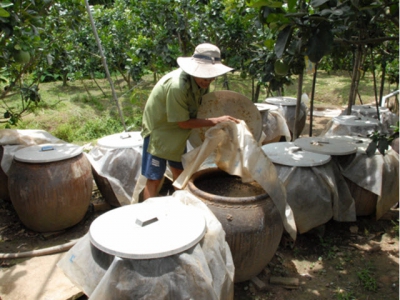More organic fertilizers, high yield and profit secured

Instead of fertilizing a lot to have a high yield, many farmers have decided to produce organically, gaining slightly lower yield but much higher profit.
Farmers compost organic fertilizer for fruit production. Photo: Le Hoang Vu.
Reduce fertilizer cost by 60%, rice yield still reaches 5 tons/ha
In order to reduce the pressure of rising fertilizer costs, many farmers at present have chosen organic cultivation.
At Chau Hung Agriculture, Production and Trade Cooperative (Bai Vang hamlet, Hung My commune, Chau Thanh district, Tra Vinh), 59 households with more than 47 ha participating in the conversion to organic rice cultivation in the 2020 autumn-winter crop. The cooperative has now grown to 162 households with an organic rice production area of 130 ha in the 2021 - 2022 winter-spring crop.
Mr. La Quoc Yen, director of the cooperative said, “The cooperative will invest in inputs such as seeds, organic fertilizers, and pesticides. At the end of the crop, the cooperative buys rice from farmers at a price higher than the market price by VND 200/kg. It is worth noting that despite converting to bio-organic processes, the rice crop still has a stable yield.
According to Mr. Cam, the production cost for the whole crop is only VND 12 million/ha. He only used 30 kg of chicken manure and 9 kg of nitrogen fertilizer, so the fertilizer cost was only VND 3.9 million/ha, much lower than the inorganic fertilizer intensive rice production model (about VND 10 million/ha).
While many people show concerns about high fertilizer prices, Mr. Cam and the members of Chau Hung Cooperative are not too worried. The production cost of the whole crop in fact is only 50-60% compared to farming according to the procedure of using chemical fertilizers, but their productivity and profits are still guaranteed.
Reduce costs by 40-50%, yet still sell at a good price
Facing the current record high fertilizer price, many farmers in fruit-specialized production areas in Can Tho City have boldly switched from chemical fertilizers to bio-organic fertilizers to reduce investment costs while still maintaining the overall yield at the end of the crop.
The 7 ha of durian garden with super-early jackfruit tree (Thai jackfruit) of Mr. Dao Huy Luc in Dinh Khanh A hamlet, Dinh Mon commune, Thoi Lai district, Can Tho city, is a prime example.
Mr. Luc said that thanks to using bio-organic fertilizers, both of his jackfruit and durian orchards are less susceptible to pests and disease, the leaves and roots grow very well. The Thai jackfruit grown in Mr. Luc's garden gives particularly large fruit with an average weight of 15-20 kg/fruit, so over 85% of the fruits are classified as grade 1 and can be sold to traders at a great price.
And in Dong Thap province, several production models have begun to form, gradually switching cultivation to the organic direction. The 8,000 m2 of green-skinned pomelos organic model of Mr. Nguyen Van Muoi (also known as Mr. Ut Mot) in Tan Binh commune, Chau Thanh district, having an annual income of hundreds of millions of Vietnamese, is one of the notable cases in the area.
"Actually, no matter how productive rice or fruit is, when the cost of fertilizers and materials is too high, there may be even a loss after deducting input costs. If the productivity is high but the overall plan turns out to be a loss, it's better to just have lower productivity but make a profit," said Mr. Ut Mot.
Having that mindset, Mr. Ut Mot studied hard and acquired experiences from many places. In the end he decided to come up with his own organic fertilizer formula by incubating soybean residues, pineapple peels, beer wort, bananas,… to replace chemical fertilizers. This has helped his family to reduce annual costs by 40-50% compared to the conventional method.
Mr. Ut Mot shares his key method:
In order to have organic fertilizer to use, he uses jars or barrels to put in soybean residues, pineapple peels, beer wort, bananas... and then incubate the decay within 1.5 - 2 months to be able to take it out and fertilize the pomelo root.
For pomelos preparing to make flowers, he mixes compost with water to spray on leaves and stems. When pomelos are in the fruiting stage (the fruit is as big as a fist), he uses self-composted organic fertilizer plus fresh milk and chicken eggs to spray on the fruits so that they can have beautiful skin, limit the attack of pests, and have their deliciousness improved.
Mr. Ut Mot took advantage of beneficial natural enemies and traps to catch insects, which is a great way to prevent pests without using pesticides. He also raised weaver ants as "bodyguards" for pomelo trees at the same time.
Weaver ants will capture and eat all kinds of worms, spiders, repel harmful winged insects, and emit a smell that scares insects away. Orchards that reared weaver ants have a reduced pest density, and the fruit is more beautiful and gleaming than those that do not raise and release weaver ants.
Có thể bạn quan tâm
 Develop mango trade in Mekong Delta urban areas
Develop mango trade in Mekong Delta urban areas Canadian experts and representatives of cities have reached a conclusion that mango should be given priority in development and have formed a trade promotion
 The fourth agricultural revolution is coming – but who will really benefit?
The fourth agricultural revolution is coming – but who will really benefit? In the case of farming, some researchers, business people and politicians think the effects of AI and other advanced technologies are so great they are spurring
 Tra Vinh wax coconut on the plane to Australia
Tra Vinh wax coconut on the plane to Australia A shipment of Tra Vinh wax coconut has just been exported to Australia by air, quickly selling out despite having a high price of VND 600,000/coconut.